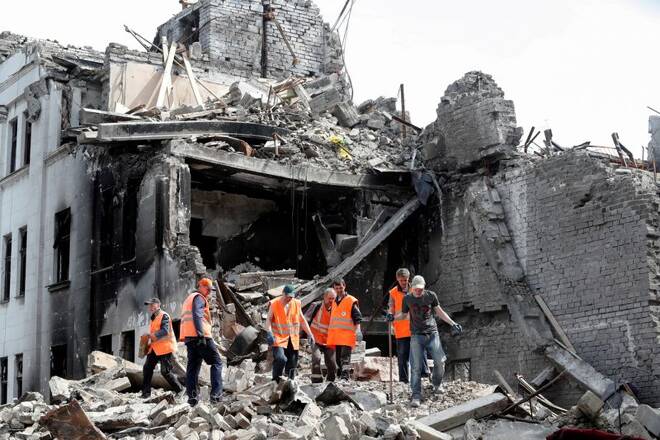Advertisement
Advertisement
Russian journalist gets six years for accusing Russia of Ukraine theatre bombing
By:
MOSCOW (Reuters) - A Russian journalist was sentenced to six years in a penal colony on Wednesday for accusing the Russian air force of bombing a theatre in the Ukrainian city of Mariupol last April where women and children were sheltering.
MOSCOW (Reuters) – A Russian journalist was sentenced to six years in a penal colony on Wednesday for accusing the Russian air force of bombing a theatre in the Ukrainian city of Mariupol last April where women and children were sheltering.
The Lenin district court in the Siberian city of Barnaul also banned Maria Ponоmarenko from working as a journalist for five years, according to a court service statement. State prosecutors had asked for a nine-year sentence.
“Patriotism is love for the motherland, and love for one’s motherland should not be expressed by encouraging crime,” Ponоmarenko told the court before her sentencing, according to the RusNews outlet where she worked. “Attacking your neighbour is a crime.”
“If it is a war – then call it a war,” she said from a cage in the courtroom. “This is a state crime against the army – it is like spitting on the graves of veterans.”
The Donetsk Regional Academic Drama Theatre in Mariupol was destroyed by an air strike on the morning of March 16, 2022. It had been used as a haven for civilians during the Russian siege of the city.
Kyiv accused Russia of bombing the theatre, while Russia said it had been blown up by Ukrainian nationalists.
Ponоmarenko was detained in April for her online posting under laws introduced shortly after President Vladimir Putin ordered troops into Ukraine. The laws impose stiff penalties for discrediting the armed forces.
Ukrainian officials said at least 300 people had been killed in the theatre.
An investigation by Amnesty International concluded that Russian forces had committed a war crime by striking the theatre. It said at least a dozen people had been killed but that many additional deaths remained unreported.
Russia says it goes to great lengths to avoid injuring civilians in its “special military operation” in Ukraine.
The newspaper Kommersant said Ponomarenko had been diagnosed with “hysterical personality disorder” while in detention, and had cut her wrists. It cited her lawyer as saying she suffered from claustrophobia and had broken a window.
(Reporting by Guy Faulconbridge; Editing by Kevin Liffey)
About the Author
Reuterscontributor
Reuters, the news and media division of Thomson Reuters, is the world’s largest international multimedia news provider reaching more than one billion people every day. Reuters provides trusted business, financial, national, and international news to professionals via Thomson Reuters desktops, the world's media organizations, and directly to consumers at Reuters.com and via Reuters TV. Learn more about Thomson Reuters products:
Latest news and analysis
Advertisement
